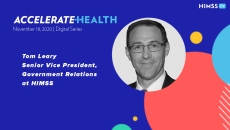Population Health
The test, which provides results in 30 minutes, is currently authorized for prescription use only.
Medicare negotiation could result in 94,000 fewer deaths annually, and reduce spending by $475.9 billion by 2030.
This partnership plans to develop scalable programs for addressing the social determinants of health throughout the state.
Two vaccines from Pfizer and Moderna have released efficacy data showing that each candidate is more than 90% effective.
SPONSORED
Leaders from Verizon, the Department of Veterans Affairs, Microsoft and Medivis discuss how Project Convergence uses 5G technology to bring augmented reality and AI to the surgical theater, thereby enhancing care to veterans.
Many fear that a lack of cooperation between the two administrations could slow the rollout of vaccines and ultimately lead to more deaths.
Government initiatives are helping to meet user demands and drive digital health in the Kingdom of Saudi Arabia, reflected in the rise of telemedicine and e-prescriptions, says Nala CEO Othman Abahussein.
Katya Hancock, the Investor Network director at StartUp Health, says although Q3 2020 was the largest quarter for digital health funding in history, there is still a long road ahead to address the most pressing healthcare needs.
Tom Leary, senior vice president of government relations at HIMSS, says ongoing Senate races could have unforeseen impacts on healthcare IT.
Early on in the pandemic, New York City was an epicenter for COVID-19 and had roughly 5% of the world’s confirmed cases.




